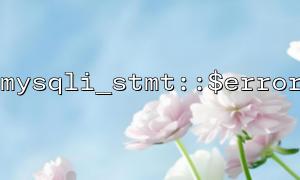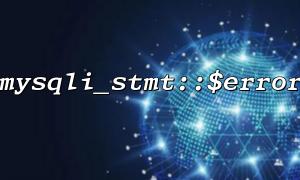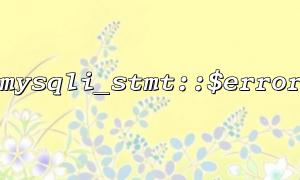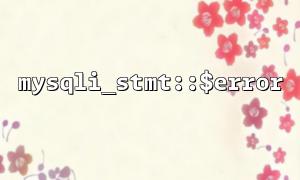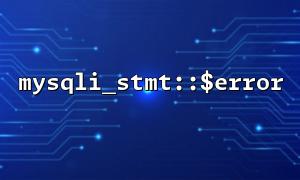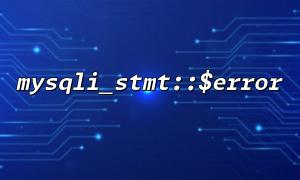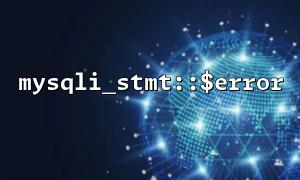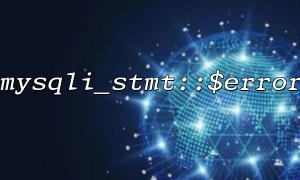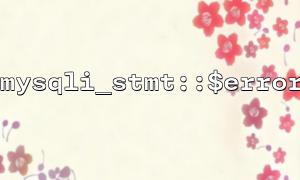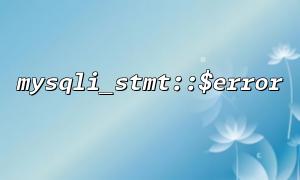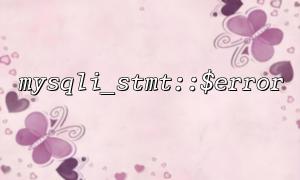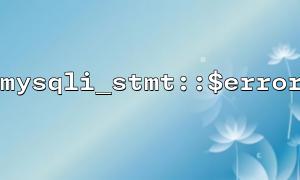In PHP, mysqli_stmt::$error is used to obtain the error message that occurs when the current prepared statement is executed. It is usually used with the mysqli extension to interact with the database. When writing PHP programs in multi-threaded or concurrent environments, developers need to pay special attention to the use of mysqli_stmt::$error , because database operations in multi-threaded or concurrent environments may cause some difficult-to-discover errors and race conditions. Here are some things to pay attention to.
In a multi-threaded or concurrent environment, race conditions may occur if multiple threads or requests share the same database connection object ( mysqli or mysqli_stmt ). mysqli_stmt::$error is bound to the database connection, so it is affected by that connection state. When accessing the same connection object in multiple threads, mysqli_stmt::$error may return inconsistent results.
For example, suppose that one query is executed in one thread and another thread executes the query on the same database connection. The error of the first thread may affect the error message of the second thread, resulting in confusion when mysqli_stmt::$error gets the error message. Therefore, it is crucial to avoid multiple threads sharing the same connection.
To avoid multiple threads sharing the same database connection, the best practice is to create an independent database connection for each request in each thread. This not only avoids race conditions, but also ensures that the mysqli_stmt::$error of each thread can accurately reflect the execution status of the current thread.
If the database connection in the application is shared globally, mysqli_stmt::$error may be affected by the operation of another thread during concurrent access, resulting in inaccurate error messages. Therefore, one independent database connection should be provided for each request as much as possible.
When using database transactions in a multithreaded environment, the value of mysqli_stmt::$error may be affected by the current transaction state. If a transaction within a thread is rolled back or committed, it may affect transaction operations in other threads. To avoid this, it should be ensured that each thread has its own transaction processing mechanism and that the management of transactions is isolated.
Especially in long-running transactions, mysqli_stmt::$error may give error prompts, causing the error message to be confused. Therefore, it is best to perform independent transactions for each thread and to accurately track the transaction state of each thread in the event of an error.
In a multithreaded environment, using Connection Pool is a common optimization technique. Connection pooling can effectively reduce the overhead of re-establishing a database connection every time you request. However, database connections in the connection pool may be shared by multiple threads, so in this case, the use of mysqli_stmt::$error still needs to be cautious. It is necessary to ensure that every connection in the connection pool is thread-safe when accessed and avoid concurrent conflicts.
To ensure that the error message returned by mysqli_stmt::$error is accurate, developers should ensure that each thread uses an independent database connection, or ensure thread safety in the connection pool implementation.
In a concurrent environment, in addition to checking mysqli_stmt::$error , you should also pay attention to the exception handling mechanism of PHP. Because PHP uses a blocking model by default, if multiple requests operate on the same connection, some operations may occur, which can lead to inaccurate error messages or delayed reporting.
In a concurrent environment, it is best to handle potential errors in database operations through appropriate exception capture mechanisms, and avoid relying on mysqli_stmt::$error to obtain error information. Through exception capture, you can have a clearer understanding of the database operation results of each thread.
PHP's mysqli extension is not thread-safe itself, especially when using global database connections, you may encounter thread-safe issues. Therefore, when using mysqli_stmt::$error in a multi-threaded environment, developers need to make sure that each thread has its own database connection and avoid sharing the same database connection object in different threads.
In addition, you can consider using PDO (PHP Data Object) extension, which provides a higher level of abstraction and better multithreading support compared to mysqli . While mysqli can avoid problems with some strategies (such as independent connections per thread), PDO may be more stable and efficient in concurrent environments.
When using mysqli_stmt::$error in a multi-threaded or concurrent environment, it is most important to ensure that each thread uses an independent database connection and avoid sharing the same connection across multiple threads. By avoiding race conditions and ensuring the independence of database operations, developers can reduce errors that may occur in concurrent operations. When using mysqli_stmt::$error , special attention should be paid to transaction management and exception handling mechanisms to ensure that each thread can be accurately obtained and error confusion caused by the complexity of the concurrent environment.
Related Tags:
mysqli_stmt